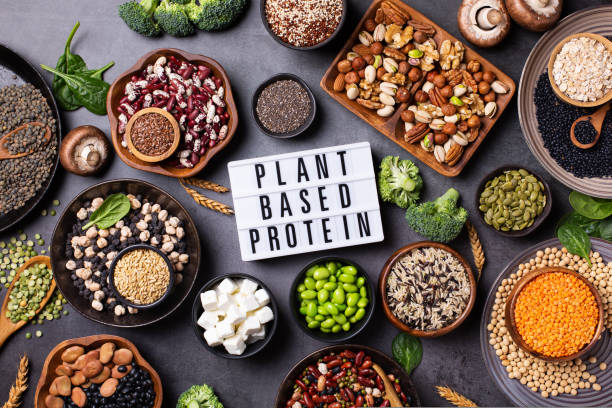
Building muscle without consuming meat is not only possible, it’s thriving. With the rise in veganism and plant-forward lifestyles, plant-based protein has become a key element in fitness nutrition. If you’re looking to bulk up on a vegan muscle-gain diet, you’re in the right place. This guide covers the top 10 protein sources for muscle gain that are entirely plant-based yet highly effective.
Why Choose Plant-Based Protein for Muscle Gain?
Many fitness enthusiasts are switching to non-meat protein sources due to health, ethical, or environmental reasons. Luckily, vegan protein for bodybuilding is no longer limited or hard to find. Today, you can build lean muscle, improve recovery, and boost energy with clean, high protein vegan foods that support your fitness goals.
1. Lentils: A Powerhouse of Plant-Based Protein
Lentils are among the most affordable and accessible protein sources for muscle gain. One cup of cooked lentils provides around 18 grams of protein. They’re rich in iron, fiber, and complex carbohydrates, making them perfect for sustained energy during workouts.
Benefits:
- Great for vegan muscle gain diets
- Promotes digestion and energy levels
- Versatile in soups, curries, and salads
2. Chickpeas (Garbanzo Beans): Versatile and Nutritious
Chickpeas offer 15 grams of plant-based protein per cooked cup. Their nutty taste and versatility make them one of the most loved non meat protein sources for athletes.
Try them:
- In hummus
- Roasted as snacks
- In high-protein vegan bowls
3. Quinoa: The Complete Protein Grain
Quinoa is unique because it’s a complete protein, meaning it contains all nine essential amino acids. With 8 grams of protein per cooked cup, it’s a staple in many vegan muscle gain diets.
Nutritional Highlights:
- Rich in magnesium and B vitamins
- Excellent vegan protein for bodybuilding
- Gluten-free and easy to cook
4. Tofu: The Classic Vegan Muscle Food
Tofu, made from soybeans, offers around 20 grams of plant-based protein per cup. It’s a classic in the fitness community due to its high protein and low-fat content.
Why it’s a favorite:
- Easily absorbs flavor
- Ideal in stir-fries, scrambles, and curries
- One of the best protein sources for muscle gain
5. Tempeh: Fermented and Protein-Rich
Tempeh contains more protein than tofu approximately 21 grams per 100g serving. Being fermented, it’s also great for gut health.
Best used in:
- Sandwiches
- Stir-fry recipes
- Grilled vegan protein meals
6. Seitan: The Wheat Meat
Seitan is a high-protein meat substitute made from gluten. A 100g serving provides up to 25 grams of protein, making it one of the highest non meat protein sources available.
Key features:
- Chewy texture similar to meat
- Ideal for vegan muscle gain diet
- Absorbs marinades well
7. Hemp Seeds: Small but Mighty
Three tablespoons of hemp seeds offer about 10 grams of plant-based protein. They are rich in omega-3 fatty acids and vital minerals.
Perfect for:
- Smoothies
- Salads
- Homemade protein bars
8. Chia Seeds: Nutrient-Dense Superfood
Chia seeds may be small, but they deliver. Just two tablespoons pack about 5 grams of high protein vegan foods, along with fiber and omega-3s.
Use them in:
- Overnight oats
- Smoothie bowls
- Vegan puddings
9. Edamame: Fresh Green Soybeans
Edamame provides 17 grams of vegan protein for bodybuilding per cup. These young soybeans are not only protein-rich but also high in iron and calcium.
Enjoy them:
- Steamed with sea salt
- In stir-fries
- As a high-protein snack
10. Nutritional Yeast: The Cheesy Protein Booster
Nutritional yeast provides about 8 grams of plant-based protein per two tablespoons. It’s loaded with B12, which is vital for those on a vegan muscle gain diet.
Great for:
- Sprinkling on pasta or popcorn
- Mixing into mashed potatoes or sauces
How to Incorporate These Protein Sources for Muscle Gain
To get the best results from these non meat protein sources, consider the following tips:
- Meal Prep: Plan your weekly meals with a variety of these high protein vegan foods
- Combine Smartly: Mix legumes with grains (like lentils + quinoa) for a complete amino acid profile
- Post-Workout: Include quick-digesting options like tofu or protein shakes made with hemp or pea protein
- Track Intake: Use a tracker to ensure you’re hitting your daily protein goals, especially during bulking phases
Conclusion
There’s no doubt that plant-based protein can effectively support muscle gain. Whether you’re new to veganism or a seasoned athlete, these protein sources for muscle gain will keep you fueled, strong, and ready to crush your fitness goals.
Visit Kamboj Fitness for more expert tips on plant-based fitness, nutrition plans, and personalized training.
